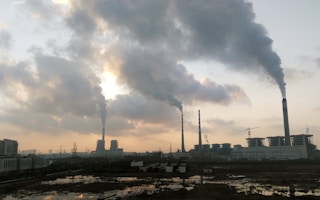Asia’s reliance on coal-fired power may prove unsustainable in the long run because thermal power plants need to be cooled down with large quantities of water, the sources of which are drying up because of climate change, says a new study.
Coal-fired power plants in India and South-East Asia are most likely to be affected by future water shortages, says the study published 20 September in Energy and Environmental Science. Already, from 2013–2016, water shortages shut down 14 of India’s 20 largest thermal power stations, costing utilities US$1.4 billion in potential revenue, according to the World Resources Institute.
“
Power plants in the region under study have high water withdrawals and discharge the warmed water in a way that can damage ecosystems.
Yaoping Wang, University of Tennessee
“Our work suggests that electricity planning in developing Asia should coordinate with water resources planning and find solutions that benefit both energy and water users,” says Yaoping Wang, lead author of the study and researcher at the University of Tennessee.
“Dry cooling equipment is not suitable for hot and humid regions like South Asia,” Yaoping tells SciDev.Net. “Power plants in the region under study have high water withdrawals and discharge the warmed water in a way that can damage ecosystems.”
According to the study, more than 400 gigawatts of new coal-fired power plant capacity are planned to be in operation by 2030 in Mongolia, South-east Asia and parts of India and China.
“Implementing more water-efficient cooling systems in power plants can help, but not universally. These systems tend to require more energy to operate, says Jeffrey Bielicki, study co-author and professor in the departments of civil engineering and geodetic engineering at the Ohio State University.
“But our study shows that the extra energy required to operate these systems is not worth it,” Bielicki tells SciDev.Net. “Altogether, planning for energy must work in concert with planning for water.”
He believes that planners should consider thinning out the fleet of coal-fired power plants to reduce local competition for water. “We didn’t look into relocating power plants but suggest that new power plants should consider their locations relative to other major demands for water.”
You might also like
Wei Peng, a professor in the department of civil and environmental engineering, Penn State University, says the new study is critical for developing Asia. “These countries are expected to experience a rapid increase in electricity demand and plan to substantially expand coal capacity. Once these new plants are built, they will be running for decades and the new capacity will become susceptible to changes in climate conditions and water availability.”
“One challenge for developing countries, in general, is the lack of data at fine spatial and temporal scale. This study combines plant-level data with high-resolution climate-hydrological scenarios to identify the potential risks for existing and new coal plants,” Wei tells SciDev.Net.
Wei says the study’s finding that careful siting of thermal power plants can be an adaptation strategy is particularly useful, though strategic siting can only help at annual or monthly scales rather than on a finer or daily scale. “This insight is of great importance for decision makers to properly account for climate risks in their investment and operational decisions,” he says.
This piece was produced by SciDev.Net’s Asia & Pacific desk.
This article was originally published on SciDev.Net. Read the original article.










